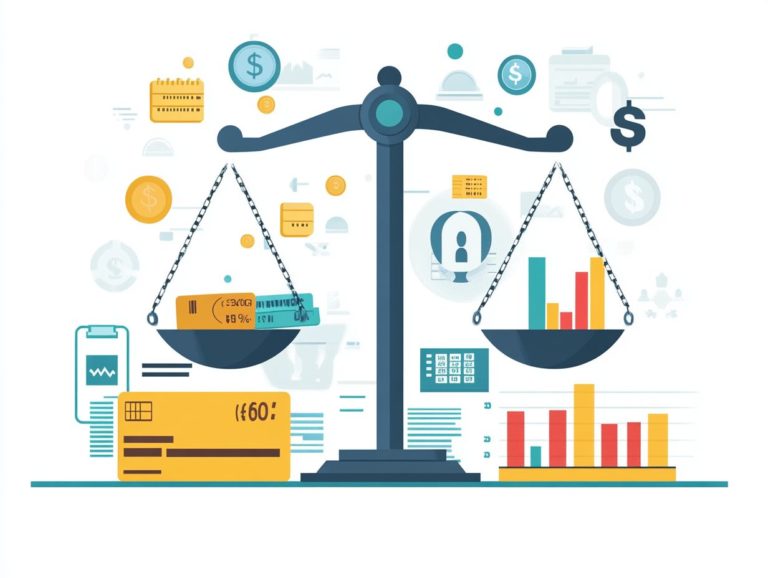Understanding the 5 Cs of Credit
Understanding the 5 Cs of Credit is crucial if you want to unlock better loan opportunities. Let’s dive in and boost your credit knowledge!
Navigating the world of credit can indeed feel like a maze, particularly when you re trying to secure a loan.
The 5 Cs of Credit Character, Capacity, Capital, Collateral, and Conditions are the fundamental criteria that lenders utilize to evaluate potential borrowers. Each of these components is vital in assessing your creditworthiness and ability to repay.
This article will guide you through each of the 5 Cs, providing insights into how they impact lending decisions and what steps you can take to enhance your credit profile.
Contents
- Key Takeaways:
- What are the 5 Cs of Credit?
- Character
- Capacity
- Understanding Capital and Its Importance
- Understanding Collateral
- Understanding Conditions
- Frequently Asked Questions
- Why is it important to understand the 5 Cs of Credit?
- What is the role of character in the 5 Cs of Credit?
- How does capacity affect a borrower’s creditworthiness?
- Why is capital important in the 5 Cs of Credit?
- What role does collateral play in the 5 Cs of Credit?
Key Takeaways:

- Understanding the 5 Cs of credit can help individuals and businesses assess their creditworthiness before applying for a loan.
- Character, capacity, capital, collateral, and conditions are all important factors that lenders consider when evaluating a borrower’s creditworthiness.
- Having a good understanding of the 5 Cs can help borrowers improve their chances of getting approved for a loan and secure better terms and interest rates.
What are the 5 Cs of Credit?
The 5 Cs of Credit serve as an essential framework that lenders and financial institutions utilize to gauge the creditworthiness of potential borrowers. This framework facilitates a well-informed decision-making process for loan approval.
These components character, capacity, capital, collateral, and conditions each play a pivotal role in evaluating your ability to meet repayment terms and manage debt obligations effectively.
They also consider credit scores and the economic conditions that influence interest rates and overall borrower risk. This ensures a comprehensive assessment of your financial standing.
Character
Character signifies a borrower’s creditworthiness, embodying their reliability and trustworthiness as determined by their credit history and borrowing behavior. Lenders meticulously evaluate this aspect to assess the potential risks involved in extending loans.
Assessing Creditworthiness
Assessing creditworthiness requires you to analyze various factors, including your credit history and credit scores like FICO and VantageScore . This data helps determine your reliability in managing debts.
Lenders employ detailed evaluation methods. They thoroughly examine comprehensive credit reports from leading agencies such as Equifax , Experian , and TransUnion . These reports provide valuable insights into your borrowing patterns, payment histories, and outstanding debts, allowing lenders to gauge your financial behavior.
A strong credit score often opens the door to favorable loan approval chances and terms, which can include lower interest rates and flexible repayment options. A lower score can lead to higher rates or even denial of credit altogether.
Thus, it’s essential for you to understand the importance of maintaining a good credit score. It not only reflects your financial responsibility but also serves as a gateway to better lending opportunities.
Capacity

Capacity is all about your ability to repay a loan. Lenders carefully assess this by examining your income, current debt obligations, and overall financial health.
A crucial metric they often rely on is your debt-to-income ratio (DTI). This ratio compares the percentage of your income that goes toward paying debts versus how much you earn. It provides valuable insight into your financial situation.
Evaluating Ability to Repay
Evaluating your ability to repay revolves around understanding your DTI ratio, existing debt obligations, and cash flow. These are key factors that lenders scrutinize when considering secured loans.
To effectively assess your repayment capability, lenders closely examine various income sources, including your salary, bonuses, rental income, and even alimony. They compare this with your regular financial commitments, such as rent or mortgage payments, utilities, and other recurring debts.
A high DTI ratio, indicating a larger chunk of your income is consumed by debt payments, can raise red flags for lenders, prompting them to proceed with caution. To enhance your repayment potential, you can work on lowering this ratio through savvy financial management. Consider reducing discretionary spending, boosting your income, or paying down existing debts. By doing so, you present a more compelling financial profile to lenders.
Understanding Capital and Its Importance
Capital refers to your financial resources, which include savings, investment accounts, and other assets. Lenders evaluate these factors to assess the risk of approving your loan.
Considering Financial Resources
Examining your financial resources means closely reviewing your capital and collateral. This review significantly affects the terms of secured debt and the overall pricing of your loan.
Collateral acts as a safety net for lenders. It minimizes their risk by providing tangible assets that can be claimed if you default.
When you have collateral, you often benefit from lower interest rates and more manageable repayment terms. This accessibility can make loans easier for you to obtain.
Common forms of collateral include real estate, vehicles, and financial accounts. Each type is appraised based on current market conditions and asset liquidity.
For example, a property’s value is assessed by its location and comparable sales. Vehicles are evaluated based on their make, model, and condition.
If you possess solid financial resources, you may gain enhanced negotiating power. This perception as a lower-risk client can lead to even better loan terms.
Understanding Collateral

Collateral is an asset you pledge to secure a loan, effectively reducing the lender’s risk. This strategy not only influences your loan terms but also impacts the overall evaluation of your risk by the lender.
Securing the Loan
Using collateral to secure your loan can greatly reduce your risk. This significantly improves your chances of approval and can lead to favorable repayment terms.
This arrangement benefits both you and the lender. As a borrower, you may enjoy lower interest rates and higher loan amounts, as lenders view you as a reduced risk.
For lenders, there’s a reassuring sense of security, knowing their investment is protected. If default occurs, the collateral can be liquidated, allowing lenders to recover losses more efficiently than with unsecured loans.
This recovery process involves assessing the market value of your collateral and following legal protocols. This ensures lenders maintain financial stability while creating valuable opportunities for you.
Understanding Conditions
Conditions refer to the broader economic factors influencing loan terms, such as prevailing interest rates and market dynamics. Lenders weigh these factors when reviewing your loan application.
Assessing Market and Economic Factors
Understanding market and economic factors is vital for lenders, as these elements dictate how interest rates align with the current economic cycle.
By recognizing these influences, lenders can adjust loan terms in response to borrower risk fluctuations.
Economic indicators like GDP growth, unemployment rates, and inflation levels are crucial for anticipating market behavior changes.
As the economy expands or contracts, these indicators signal how borrowers can repay loans. This impacts how lenders assess creditworthiness.
By closely monitoring these trends, lenders can adapt strategies to offer competitive rates while managing risk in varying economic climates.
Frequently Asked Questions

What are the 5 Cs of Credit?
The 5 Cs of Credit are the key factors lenders consider when assessing a borrower’s creditworthiness: character, capacity, capital, collateral, and conditions.
For personalized advice on securing a loan, contact us today!
Why is it important to understand the 5 Cs of Credit?
Understanding the 5 Cs of Credit boosts your creditworthiness. This knowledge increases your chances of getting approved for loans and credit cards.
What is the role of character in the 5 Cs of Credit?
Character shows your reputation in managing finances. It’s about your credit history, payment habits, and job stability.
How does capacity affect a borrower’s creditworthiness?
Capacity is your ability to repay a loan. Lenders check your income and expenses to see if you can afford payments.
Why is capital important in the 5 Cs of Credit?
Capital is about your assets and net worth. A strong capital base reassures lenders that you can handle unexpected events.
What role does collateral play in the 5 Cs of Credit?
Collateral is an asset you pledge to secure a loan, like a house or car. It gives lenders security if you can t repay the loan.






